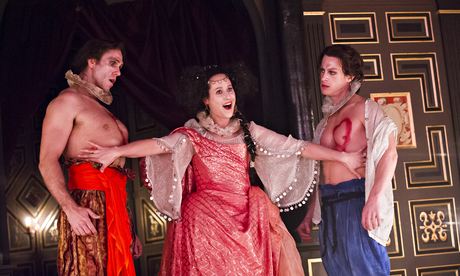
Francesco Cavalli's L'Ormindo opens with the dedication of a stage. The goddess of music descends from heaven to sanctify "these oaken boards and arches" where her singers are to appear. In Kasper Holten's new Royal Opera production, the symbolic resonance is immense: this is the first opera to be performed at the Wanamaker Playhouse, the small, candlelit Jacobean indoor theatre at Shakespeare's Globe. It proves to be the well-nigh perfect venue for baroque music.
Cavalli's erotic comedy was premiered in 1644 at the Teatro San Cassiano in Venice, the first opera house to open its doors to a paying public. A revival at Glyndebourne in 1967 marked the start of the composer's return to favour after centuries of neglect.
The opera opens with the princes Ormindo and Amidas – friends in war, now rivals in love – both embroiled with Erisbe, the wanton queen of Casablanca. Cavalli then sets out on two parallel narratives, each, rather ingeniously, with Erisbe at its centre, and both subject to sardonic scrutiny by the protagonists' servants.
Ormindo has to deal with Erisbe's decrepit, if murderous husband, Ariadenus. Amidas finds himself facing his abandoned ex, Sicle, who is determined to get him back by any means possible. Part-way through, however, the dramaturgy falters. Cavalli leaves us hanging after reconciling Amidas and Sicle too soon, though the hiatus opens the way for an extended duet for Ormindo and Erisbe, both momentarily facing death, that is one of the glories of his output.
Holten stages it wonderfully well. Gods descend through the ceiling, and Amidas is conned into believing that spirits erupt through the floor. The servants trade amorous indiscretions with the audience, while their masters succumb self-pityingly to the vagaries of desire.
The candles blaze, meanwhile, to mark the transition from winter to spring, but are snuffed out one by one as games of love turn slowly to games of death.
Musically, it's first rate, too, though Christian Curnyn, conducting a small ensemble from his Early Opera Company orchestra, is more reined-in than one might expect after his recent, very blatant Handel at ENO. The cast don't put a foot wrong. Samuel Boden's dreamy Ormindo is beautifully contrasted with Ed Lyon's assertively sexual Amidas. Susanna Hurrell and Joélle Harvey sound terrific as Erisbe and Sicle respectively. You can't fault the servants. A more exquisite evening would be hard to imagine.
• Did you catch this show – or any other recently? Tell us about it using #gdnreview

